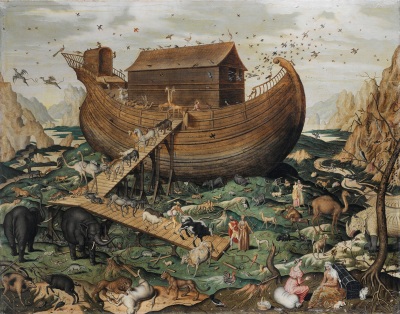 As a child, I enjoyed the story of Noah’s Ark. I would often imagine pairs of animals running for safety in Noah’s architecturally majestic haven. Practical questions didn’t enter my mind during this blissful period of naivety. I ignored the part where God expressed regret in creating humanity, or when Noah gets drunk and lies bare naked for his children to cover his shame. My bible study teacher would explain to us that the point of the story was that Noah, a holy man, trusted God and carried out his will.
As a child, I enjoyed the story of Noah’s Ark. I would often imagine pairs of animals running for safety in Noah’s architecturally majestic haven. Practical questions didn’t enter my mind during this blissful period of naivety. I ignored the part where God expressed regret in creating humanity, or when Noah gets drunk and lies bare naked for his children to cover his shame. My bible study teacher would explain to us that the point of the story was that Noah, a holy man, trusted God and carried out his will.
Disclaimer: I understand that the film is not meant to be an exact representation of the story in the bible, but loosely based around it. Also, if you plan on watching the film, read at your discretion.
In the film, Noah’s character is played by leading actor Russell Crowe, who appears strong, confident, and zealous in his trust in God – all necessary qualities to fulfill God’s demand of killing off the rest of humanity because of their wickedness. Later in the film, Noah realizes that he and his family are also wicked leading to his revelation, ahem, God’s revelation, that humanity must cease with Noah’s family. This doesn’t pan out too well with his children and wife. It was also bad news for Emma Watson, the orphan girl Noah’s family saves and raises as their own, who after accepting that she is barren is miraculously healed and gives birth to two girls. Noah decides that the female infants must die according to God’s will to end humanity.
Noah’s wife, starring Jennifer Connelly, and Emma Watson’s character plead with Noah to save the two girls, but Noah is determined to carry out God’s demands. You know, because if God did exist, he would order two infants to die. In the end, Noah can’t go through with killing the infants. Once they reach land, Noah disengages from his family after the tumultuous events. Towards the end of the film, Emma Watson encourages Noah to be with his family through explaining that he shouldn’t feel like a failure for not killing the infants, rather as a hero for choosing love. In other words, she believes God didn’t tell him to kill the children, rather God allowed Noah to choose. And instead of choosing wickedness, he chose love.
 While I found the cinematic feature to be generally prosaic, it did reconstruct my perception of the story of Noah’s Ark. The bible study teacher from my past was wrong. Noah’s Ark isn’t about a man’s obedience to God. It’s about humanity’s battle with choice. I understand that people’s poor choices which lead to destruction, death, and suffering cannot easily be reconciled with our complementary need for morality. By displacing a portion of the anxiety derived from our wrongdoings onto an imaginary force, we find a level of peace and affirmation in our actions. The women in the film – Noah’s wife and the orphan girl – realized that it was a choice. All of Noah’s actions were rooted in his own understanding of the world and God. While this wasn’t explicitly expressed in the film, I found this subtle idea much more beneficial to the advancement of humanity.
While I found the cinematic feature to be generally prosaic, it did reconstruct my perception of the story of Noah’s Ark. The bible study teacher from my past was wrong. Noah’s Ark isn’t about a man’s obedience to God. It’s about humanity’s battle with choice. I understand that people’s poor choices which lead to destruction, death, and suffering cannot easily be reconciled with our complementary need for morality. By displacing a portion of the anxiety derived from our wrongdoings onto an imaginary force, we find a level of peace and affirmation in our actions. The women in the film – Noah’s wife and the orphan girl – realized that it was a choice. All of Noah’s actions were rooted in his own understanding of the world and God. While this wasn’t explicitly expressed in the film, I found this subtle idea much more beneficial to the advancement of humanity.
Social injustices are difficult to confront because it reminds us of our inescapable humanity. The problem is that our society is constructed in a way that encourages people to hide from their shame and injustice through religion or other means; rather than dealing with its complexities. Humans are constructed to love and hate. Care for and abandon. Protect and murder. These generalized binary formations are meant to provide insight into how we possess both good and bad. In this case, we need to embrace both. Obviously, embracing the negative qualities doesn’t mean we should give into every impulse we experience. Rather, we evaluate the situation at hand and find solutions that benefit everyone involved, while being honest about our vulnerabilities and fears.
You may peg me as a dreamer, but consider this: If we possess both good and bad to varying degrees, why not be encouraged that we can tap into both through practice? Egalitarian practices are about recognizing all sides of the equation before making a decision. If we continue to ignore why we inflict pain unto ourselves or others, how can we ever truly engender change?
To me, Noah’s Ark isn’t a story about being obedient to an imaginary being. It’s a life lesson about the ongoing difficulties humans face in choosing to deconstruct unsettling feelings and actions regarding human behavior. Noah found his peace and confidence through projecting his own insecurities about the world onto God. This choice, however, led to his persistent shame and confusion about the injustices in the world.
You see, our humanity never goes away. No God, Goddess, or other spiritual entity will save you from yourself.
So, what will you choose?
Andreea Nica is a freelance writer, scholar, egalitarian, and yogi. She holds a M.S. from the London School of Economics and Political Science in Gender, Media, and Culture Studies. Andreea also holds a B.A. in Psychology from Northern Arizona University. Currently, she is writing her memoir on transitioning from Pentecostalism, focusing on institutional power, subjectivities, and socialization. She is the Founder of OrganiCommunications, empowering startups and social enterprises in strategic and digital communication ventures. She is the author of 2 blogs: OrganiCommunications and Progressive Thinking. You can find her in Seattle, WA. with her partner and kitty, probably doing yoga.@convergingearth @integratedcom


That is a good message. Powerful. If we are to be fully human, then utter freedom is our burden and blessing. An excellent statement against the rejection of human responsibility heard too often before someone gives in to their ego’s desire for unethical, ugly behavior…”but it’s God’s Law.” Rather, taking full responsibility to live beautifully in this world is God’s Law.
LikeLike
Very true Laury. Thanks for your encouraging comments!
LikeLike
Thought-provoking post Andreea.
LikeLike
Thank you for reading Barbara!
LikeLike
The story of Noah, like nearly everything in the OT, is myth, not much different from Greek, Roman, Mesopotamian, or any other body of mythology. The movie sounds stupid. I’ve never been a fan of biblical movies because they seem to be mostly special effects–like Charlton Heston parting the Red Sea–and the fantasies of screenwriters eager to pull in big box office. I’m not impressed by Russell Crowe. But you wrote a very interesting and thoughtful blog! Good for you!
LikeLike
Yes, I can agree that biblical movies are often not a good representation of biblical scripture. However, I have always thought that Spielberg should do a rendition of the book of revelation with a focus on the apocalypse. :) Thanks for reading!
LikeLike
Reblogged this on Progressive Thinking.
LikeLike